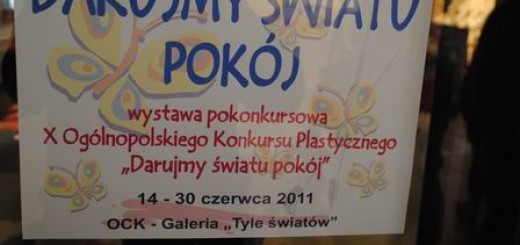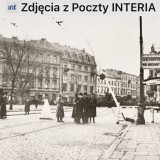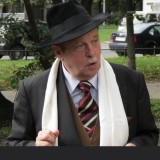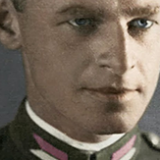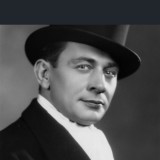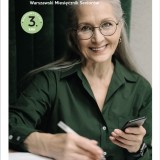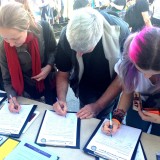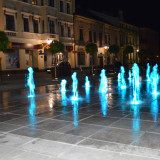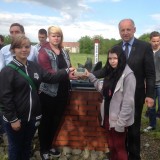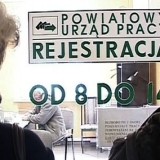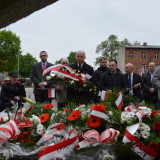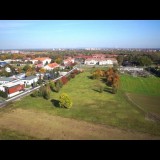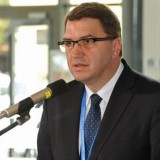Newsletter ESU 146
Dostępne tylko wersje w językach niemieckim i angielskim.
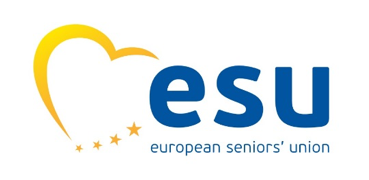
EUROPÄISCHE SENIOREN UNION (ESU)
EUROPEAN SENIORS´UNION (ESU)
Newsletter SENIOR INTERNATIONAL Ausgabe Nr.146 (deutsch) 17.März 2017
„Vom Wissen zum gesellschaftlichen Handeln“
An Hermans in Prag: Jede Stimme, jede Tat für EUROPA zählt!
Prag. In der Tschechischen Republik leben fast zwei Millionen Bürger, die das 65. Lebensjahr erreicht haben. Sie machen 18 Prozent der Bevölkerung Böhmens und Mährens aus. Der Anteil Älterer wird – wie überall in Europa – weiter steigen. Dass sich die Lebenserwartung für die meisten erhöht, ist ein Geschenk – für die „in die Jahre Gekommenen“ wie für die Gesellschaft. Die Politik hat es so gewollt. Den „gewonnenen Jahren“ mehr Qualität zu geben ist Sache des Einzelnen und der Gesellschaft. Politiker sprechen von „Herausforderungen durch den Demographischen Wandel“. Sofern damit nicht ein überholtes „Altersbild“ einhergeht, ist dieser Begriff akzeptabel.
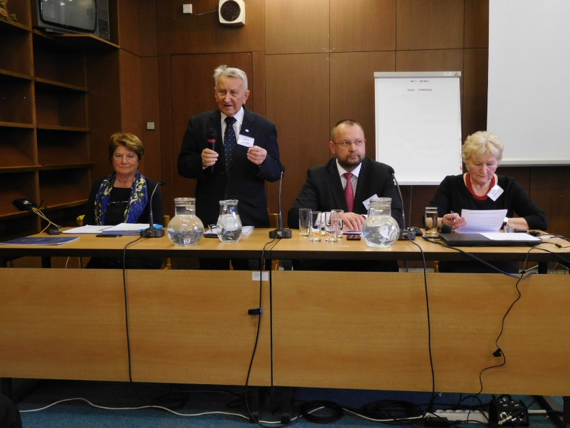
Dr. Vaclav Roubaul bei seiner Begrüßungsansprache. Neben ihm links: Prof. Dr. An Hermans, Präsidentin der Europäischen Senioren Union, rechts Jan Bartosek, Vizepräsident der KDU/CSL und der Tschechischen Abgeordnetenkammer,sowie Doz. Lidmila Nemcova, ESU-Vizepräsidentin
Die 9. Internationale Konferenz der ESU in der Region „Ost“ – schon die dritte seit 2011 – hat sich diesen Herausforderungen gestellt. Im Prager Hotel „Krystal“ trafen sich Persönlichkeiten aus sechs Ländern, die Worte zu Taten machen. Sie folgen – bewusst oder unbewusst – dem Anspruch, den die ESU-Präsidentin An Hermans an sich stellt. Im Jahr 2014 erklärte sie an gleicher Stelle: „Ich wollte und will – wie die meisten von Ihnen – nicht nur wissen, kennen, sondern auch machen, handeln: in sozialen Bewegungen, in Kirchen, in Vereinen und in Parteien an einer Gesellschaft arbeiten, in der Freiheit, Respekt vor jedem Menschen, Frieden und Demokratie die Pfeiler zum Aufbau von Wohlstand und Wohlbefinden sind.“ Diesen Anspruch haben die Menschen aller Kontinente und veranlassen viele Bürger aus Kriegs- und Krisengebieten, im Gefühl der Hoffnungslosigkeit ihre Heimat auf der Suche nach Asyl und Lebensglück zumindest vorübergehend aufzugeben. Mit ihrem Impulsreferat am diesjährigen 10.März in Prag, das den Titel trug „Die Lebensqualität verbessern – Überlegungen aus einer europäischen Perspektive“ knüpfte die Präsidentin an ihr Bekenntnis an. Sie dankte der gastgebenden Vereinigung Christlicher Senioren unter Vorsitz von Dr.jur. Vaclav Roubal, dass sie sich – moderiert von ESU-Vizepräsidentin Doz. Lidmila Nemcova – diesem Thema widmet und dazu „Macher“ eingeladen hatte. In einer historischen Rückschau erinnerte die Präsidentin an die „Römischen Verträge“, mit denen am 23. März vor 60 Jahren die Europäische Wirtschaftsgemeinschaft (EWG) geschaffen wurde. Das war ein wichtiger Schritt zur Europäischen Union. Ihre Unterschriften leisteten damals Belgien, Frankreich, Italien, Deutschland, Luxemburg und die Niederlande. Bereits 1993, als erst 16 Staaten zur EU gehörten, wurde ein „Jahr des älteren Menschen“ begangen. Besonders inspiriert fühle sich die ESU vom „Lissabon-Vertrag“ vom Dezember 2013, der die Grundrechte verankerte. Es sind: Würde des Menschen, Freiheit, Gleichheit, Solidarität, Bürgerrechte und justizielle Rechte. An Hermans forderte die ESU-Verbände auf, die aktuellen Untersuchungsergebnisse der EU für ihr Land zu analysieren und mit den Politikern vor Ort – analog zum Prager Konferenzthema „Mehr Lebensqualität der Senioren“ – die nächsten Schritte zu gehen. Die ESU – so die Präsidentin – werde ihrerseits die Europäische Volkspartei (EVP/EPP) zu konkreten Strategien drängen. Das Motto dafür lautet: „In gemeinsamer Welt alt werden – gemeinsam verantwortlich sein !“ Es geht um Aktives Altern, wozu Beschäftigung, gesellschaftliche Teilhabe sowie selbstständiges und gesundes Leben in angenehmer Umwelt gehören. Im Blick auf die Redebeiträge und Präsentationen der Teilnehmer stellte die ESU-Präsidentin am Ende der zweitägigen Beratung unter Beifall fest: Jeder kann sich und seinem Mitmenschen Lebensinhalt geben; Erfahrungsaustausche wie diese inspirieren zu neuen Konzepten für eine altersfreundliche Gesellschaft, und sie stärken die Position führender Seniorenpolitiker in Europa. Unsere Stimme, unser politisches und soziales Wirken hilft, Probleme des vereinten Europas zu überwinden. Demokratie und Wohlstand für alle Generationen – das ist die vorrangige Aufgabe der Kommunen, Regionen, Länder und der Vereinten Nationen gleichermaßen und fordert alle heraus, sagte An Hermans abschließend.
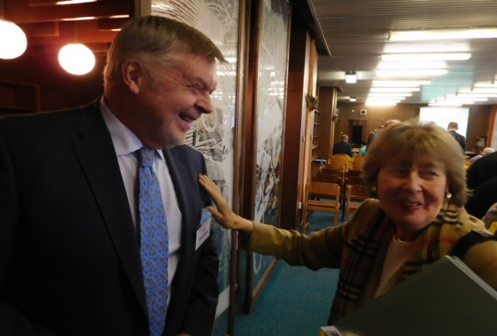
In der Diskussion sprach sich Dr. Marilies Flemming (Österreich) für mehr Obacht auf die christliche Erziehung der Heranwachsenden aus. Dafür setzte sie sich auch früher als Ministerin und EU-Parlamentarierin ein. In einer Pause tauschte sie mit Leif Hallberg (Schweden), Ehrenpräsident der ESU, Erfahrungen aus ehrenamtlicher Tätigkeit aus, die beide seit Jahren verbindet.
„In Würde alt werden!“
Was die Redner der Prager Konferenz bewegte
Vaclav Roubal stellt fest: Die tschechischen Senioren sind gut in die Gesellschaft integriert „Glücklich fühlen sie sich nur, wenn es auch ihrer Familie gut geht.“ Die Zehn Gebote sind aktuell wie eh und je.
Jan Bartosek, KDU/CSL, dankt dem Seniorenverband und der ESU für ihr Wirken. „Wohlbefinden“ sei eine komplexe Aufgabe. Im Programm seiner Partei sind gegenseitige Hilfe der Generationen und die Sicherung im Alter verankert. KDU/CSL ist die Christlich-Demokratische Union /Tschechoslowakische Volkspartei, mit der sich die Vereinigung Christlicher Senioren (SKS) verbunden fühlt.
Jozef Miklosko, Präsident Vereinigung Christlicher Senioren der Slowakei: In ethischer Verantwortung tätig werden! Die Chancen des Alters nutzen! In der Slowakei (3 Mio. Senioren) gibt es 5 Seniorenverbände; seine Organisation hat 5000 Mitglieder und ist damit die größte mit der ESU verbundene Assoziation in einem postkommunistischen Land. „Sie wurde in Nitra gegründet, als es die ESU noch gar nicht gab.“ 43 % der Ehen werden geschieden. Verband hat mehrere Wallfahrten organisiert. Lädt für 5. Juli zu einer weiteren ein.
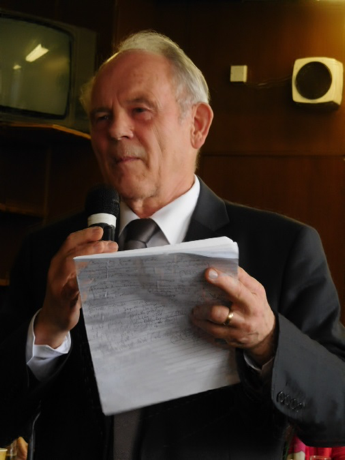
Jozef Miklosko
Jiri Vanasek, Stellv. Minister Tschechiens für Arbeit und Soziales: Nach dreijähriger Diskussion steht ein Gesetz über soziale Dienste vor der Beschlussfassung. Die gute ökonomische Situation erhöht bei über 50jährigen Bewerbern die Chancen auf einen Arbeitsplatz. Auf die Unternehmen wird entsprechend eingewirkt. Einer ermäßigten Mehrwertsteuer auf Medikamente soll die Minimierung der Zuzahlung folgen.
Pater Miloslav Fiala OPraem, der in Vertretung des Prager Erzbischofs, Kardinal Duka, teilnahm, sagte: „Ich bin in Sorge um die Würde des Menschen.“ Trotz guter materieller Versorgung fühlen sich viele vereinsamt. Von 15 Schülern hat nur ein Kind eine komplette Familie, also Mutter u n d Vater! Die Evangelien geben Hinweise zur Lebensführung. “Fang jeden Tag an unter Gottes Wort“.
Zdenek Permes, Präsident des Tschechischen Seniorenrates (umfasst 31 Organisationen mit 300 000 Mitgliedern; hohe gesellschaftliche Akzeptanz; Vizepräsident: Dr. Roubal) stellt fest: Fast 2,4 Millionen Tschechen sind Rentenbezieher. Ihre Bezüge wurden kürzlich auf – umgerechnet – etwa 436 EURO) erhöht. (Umrechnungskurs am 10. März: 25 – 27 Kronen für 1 EURO.) In der Rentenhöhe rangiert Tschechien bei 24 bewerteten Ländern auf Platz 15. Lebensqualität wird seit 2014 amtlich untersucht. Verbraucherpreise sind gestiegen. Permes hofft auf Erfolg für parlamentarische Initiative zur Veränderung des Rentensystems (nach dem Umlagesystem). Neues Gesetz über sozialen Wohnungsbau kommt Single-Haushalten zugute. Kontakt: www.rscr.cz In der Diskussion bedauert Dr. Milos Nemecek das Fehlen eines Seniorenrates in der Slowakei und regt an, dass „sich die westlichen Staaten mit der Situation im Osten vertraut machen“. Niedrige Renten sind Ergebnis niedriger Löhne. Eine „Mindestrente“ gibt es nicht; im Bedarfsfall werden zusätzliche Leistungen wie Wohngeld gewährt, dennoch sei die Situation unbefriedigend, die Armut groß.
Karel Schwarz, Präsident EAPN: Verwitwete und geschiedene Frauen brauchen besondere Unterstützung. Besseres Zusammenwirken der Hilfsmaßnahmen ist erforderlich. EAPN tritt für Verbleib der Älteren „so lange es geht“ in gewohnter Umgebung ein. Wohnungen müssen rechtzeitig, prophylaktisch angepasst werden (Barrierefreiheit). Zur Lebensqualität gehören Seniorentaxis und Fahrdienste (z.B. für den Weg zu Universitäten der 3. Lebensphase oder zum Vorlesen in Kindereinrichtungen). EAPN steht für „European Anti-Poverty Network“. Poverty bedeutet Armut.
Lidmila Nemcova (CZ) bietet Wiederaufnahme der Zusammenarbeit mit slowakischem Verband an. Die Lebensqualität der Senioren wird von sozialen und ethischen Beziehungen bestimmt. Geprägt von Erinnerungen an Krieg und autoritäre Regimes in der Jugend sehnen sich die Älteren (und alle anderen Generationen) nach „Stabilität in der instabilen Welt“. Sorgen um Demokratie, die Schere zwischen Arm und Reich, Werteverfall und die Zukunft Europas beherrschen den Alltag, erklärt Frau Nemcova. Politik muss Antworten geben. Von diesen Ausführungen angeregt, zitiert Dr. Roubal aus dem Weihnachtsbrief von Dr. Worms, der darin die Frage stellte, ob wir Mut zur Gestaltung Europas aufbringen oder uns zurück ins Schneckenhaus begeben wollen.
Dr. Edeltraud Paul (Österreich) vermittelt Erfahrungen mit dem „Betreuten Wohnen“, das in ihrem Land immer häufiger Altenheime ersetzt und mehr bietet als „Warm, satt und sauber“. Sechs bis acht
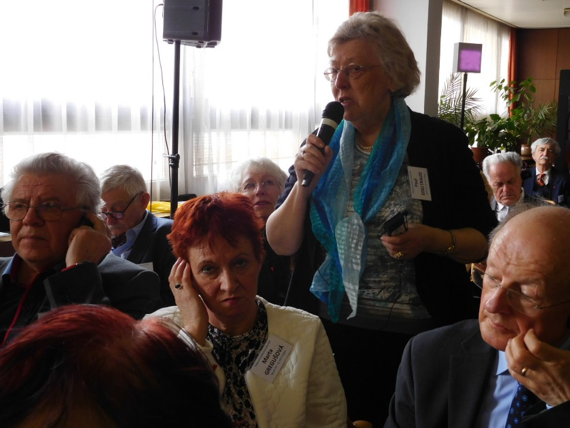
Dr. Edeltraud Paul
Personen teilen sich eine Wohnung und sorgen für sich selbst. Geschäfte, Apotheke, Kaffeehaus, Verkehrsmittel und Arzt befinden sich in zumutbarer Entfernung. Beispiele gibt es in Wien, wo die Stadt größter Wohnungsvermieter ist, aber auch in Vorarlberg (Stadt Lustenau). Für die beteiligten Organisationen wie Caritas, Hilfswerk und Sine Cura gilt als Motivation: „Würdevoll alt werden“. Empfohlen wird die Einbeziehung der Politiker in Planung und Durchsetzung solcher Projekte.
Milena Cerna, frühere Vorsitzende der Olga-Havlova-Stiftung (VDV), die nach der 1996 verstorbenen Gattin des Staatspräsidenten und Dichters Vaclav Havel benannt ist: VDV unterstützt häusliche Pflege und Kurzzeitpflege. Finanzierung durch Benefiz-Konzerte und Nachlässe, die 2015 mehr als 4 Mio. Kronen ausmachten. Allein in jenem Jahr wurde 1288 Personen Hilfe zuteil. Im Zusammenwirken mit Caritas, Diakonie und Böhmischen Brüdern werden Bewohner entlegener Streusiedlungen über den Winter in die nächst gelegenen Städte gebracht und behalten somit auch soziale Kontakte.
Milos Nemecek, Unternehmer und Redakteur, Slowakei, präsentierte die neueste Ausgabe des „Magazins pre aktivnych seniorow“ mit dem Titel „Generácie“. Darin werden in Text und Bild vielfältige gesellschaftliche Aktivitäten der älteren Generation und das Miteinander von Alt und Jung dokumentiert.
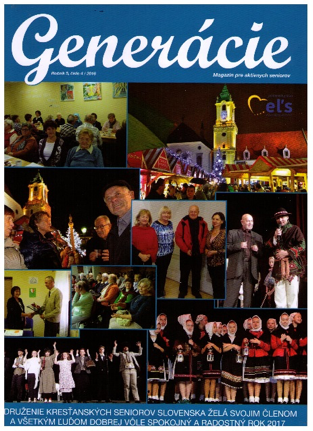
Titelbild der aktuellen Ausgabe
Ulrich Winz, Verfasser dieses Berichtes, ergänzt zum Thema „Senioren und Medien“: Auch die CDU-Senioren-Union (DE )gibt eine Vierteljahresschrift (“Souverän“) heraus – seit 2001 mit einer ESU-Kolumne -, überdies einen Newsletter. Bulletins sind ihm bekannt von der CSU-Senioren-Union (Bayern) (Titel: „SenNetz“) und aus Belarus („Nashe Pokolenie“). „SENIOR INTERNATIONAL“ wird ehrenamtlich ins Englische, Tschechische, Russische und Slowenische übersetzt, neuerdings auch sporadisch ins Spanische. Claus Bernhold, Stellv. Vorsitzender der Senioren-Union und Mitglied des Exekutivkomitees, sorgt als Pressesprecher für aktuelle Informationen aus seinem Verband. Die Polnische Senioren-Union platziert diesen Newsletter auf ihrer Website. Das Interesse der älteren Generation an Print- und digitalen Medien (bei der ESU: Facebook und Twitter) ist anhaltend stark – Ausdruck geistiger Frische Älterer und ihres Wunsches, in der ESU „auf dem Laufenden“ zu bleiben.
Thomas David vom National-Fonds der Experten (Prag), sieht in der Qualifizierung von über 50jährigen eine wichtige Voraussetzung für einen Arbeitsplatz bis zum Renteneintrittsalter. Dafür wird das Knowhow von Pensionisten genutzt. Mail-Kontakt: tomas.david@czechtop100.cz
Janusz Marszalek, Oswiecim, Präsident der Polnischen Senioren-Union (PUS) und ESU-Vize, pflegt enge Kontakte mit dem Verband der „Universitäten der 3. Lebensphase“, der sich für einen Zusammenschluss der Senioren-Organisationen und -Initiativen nach dem Beispiel der BAGSO in Deutschland interessiert. Das am Vortag von der BAGSO in Berlin diskutierte Projekt „Auf Rädern zum Essen“ (statt „Essen auf Rädern“) hält Marszalek für nachahmenswert: Gemeinsame Mahlzeiten an einem günstig gelegenen Ort fördern soziale Kontakte und damit die Freude am Leben. Das polnische Parlament bereitet derzeit ein Pflegegesetz vor. Neben dem „Friedenszentrum“ in Oswiecim (früher Auschwitz) gehört „Betreutes Wohnen“ zu den bevorzugten PUS-Projekten. Marszaleks Anregung zu Exkursionen von Seniorengruppen nach Polen findet bei tschechischen und slowakischen Freunden Zustimmung.
Leif Hallberg (Schweden), Präsident des Seniorenverbandes der Moderaten und ESU-Vize, hält lebenslanges Lernen für unverzichtbar. In Übereinstimmung mit Erkenntnissen der Universität Göteborg stellt er fest: Das Lebensalter wird maßgeblich bestimmt von gesundem Schlaf, gutem Essen, hoher Aktivität und sozialen Kontakten, aber freilich auch von genetischen Faktoren. In Schweden müsse man „jung, frisch und neu“ sein. Die geriatrische Ausbildung von Ärzten und Schwestern ist verbesserungswürdig und um den Problemkreis „Psychiatrie“ zu ergänzen. Leif spricht sich für Diskussionen von Alt und Jung aus, wünscht sich Berücksichtigung differenzierter Bedürfnisse der Generationen und stärkeres Eingehen auf seelische Belange. Von Politikern, Abgeordneten und Regierungen müssten neben praktischem Handeln auch langfristig angelegte Strategien eingefordert werden.
Claus Bernhold (Deutschland) fordert Respekt vor dem Alter und Würde des Menschen bis zum Lebensende ein. In Baden-Württemberg werden demzufolge Senioreneinrichtungen mit maximal 100 Zimmern (Einzelzimmern) gebaut. 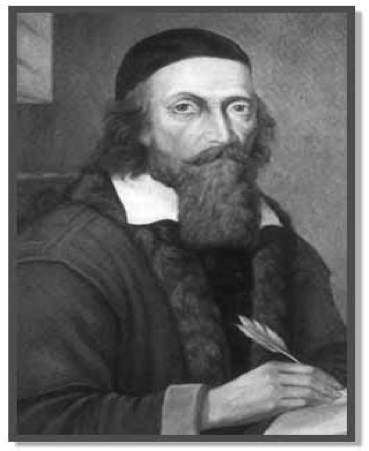
Besuch bei Jan Amos Comenius (Komensky)
Am Rande der Regionalkonferenz lernten die ausländischen Teilnehmer das Pädagogische Museum Prag mit dem Namen „Jan Amos Comenius“ (tschechisch: Komensky) kennen. Im Einführungsvortrag der Museologin wurde deutlich, dass Comenius mit seinen Bildungsreformen der Zeit weit voraus war und nicht allein durch seine wechselnden Aufenthaltsorte, sondern infolge seiner universellen Ansätze als ein großer Europäer zu gelten hat, dem auch die ESU gern ihre Reverenz erweist. Comenius war am 28.März 1592, also vor 425 Jahren, in Vivnice (Mähren) geboren und am 15. Nov. 1670 in Amsterdam gestorben. Sein Grab ist in Naarden (NL). Er war Philosoph, Theologe, Pädagoge und Bischof der Böhmisch-Mährischen Brüder.
Letzte Meldung:
Marjatta Nykänen: „Froh über das Votum der Niederländer”
Dass sich die Wähler am 15. März bei den Parlamentswahlen ganz überwiegend für demokratische Parteien entschieden, wird als Sieg der politischen Vernunft gewürdigt. Marjatta Nykänen, ESU-Vizepräsidentin aus Finnland, äußerte gegenüber der Redaktion: „Ich bin froh, dass die Niederländer für die europäische Einigung und Stärkung unserer gemeinsamen europäischen Zukunft gestimmt haben. Wir müssen die populistischen Bewegungen gemeinsam stoppen. Europas Senioren sind sicherer auf einem Kontinent, auf dem Politik auf Fakten beruht und nicht bloß auf populistischen Sprüchen.“ ____________________________________________________________________
IMPRESSUM
Redaktion: ulrich.winz@web.de; Tel.: +49 (0) 30 204 04 71
Eine englische Version ist in Vorbereitung /The English version will be published a few days later.
ESU: Rue de Commerce/Handelsstraat 10, 1000 Brussels; Tel.:+ 32 23 09 28 66
Facebook: com/esu.eu; Twitter: esu_epp; Internet: www.esu-epp.eu; Mail: esu@epp.eu
EUROPEAN SENIORS´UNION (ESU)
Newsletter SENIOR INTERNATIONAL
Issue No. 146 (English)
20th March 2017
„From Knowledge to Social Action”
An Hermans in Prague: Every voice, every act for EUROPE counts!
Prague. In the Czech Republic, almost two million citizens have reached 65 years of age. They account for 18 per cent of the population of Bohemia and Moravia. The percentage of older people – as elsewhere in Europe – will continue to rise. The fact that life expectancy increases for most is a gift – for those “advanced in years”, as well as for society. Politics has wanted it so. Giving the “extra years gained” more quality is a matter for the individual and for society. Politicians speak of “challenges through demographic change”. If this is not accompanied by an outdated image of “old age”, this term is acceptable.

Dr. Vaclav Roubal in his welcome speech. Next to him (left): Prof. Dr. An Hermans, President of the European Seniors‘ Union, Jan Bartosek, Vice-President of the KDU/CSL and the Czech Chamber of Deputies, as well as Lidmila Nemcova, ESU Vice-President
The 9th International Conference of the ESU in the “East” region – already the third since 2011 – has met these challenges. In the Prague hotel “Krystal”, personalities from six countries met who put words to deeds. They follow – consciously or unconsciously – the demands of ESU President An Hermans. In 2014, in the same place, she said: “I wished and want to, as most of you do, not only to know, but also to do something, to act: in a social movement, in churches, in clubs and in parties, to work for a society in freedom, respect for every human being, peace and democracy, which are the pillars for building prosperity and well-being”. The people of all continents have this aspiration and it is prompting many citizens from war zones and crises to leave their homeland, at least temporarily with a feeling of hopelessness, to seek asylum and a better life.
With her stimulating speech on the 10th March this year in Prague, entitled “Improving the Quality of Life – Observations from a European Perspective”, the President declared her commitment. She thanked the hosting Association of Christian Seniors, chaired by Dr. Jur. Vaclav Roubal, that she – presented by ESU Vice President Doz. Lidmila Nemcova – dedicated herself to this topic and invited the “movers and shakers” to follow.
In a historical reflection, the President recalled the “Roman Treaties”, which established the European Economic Community (EEC) on 25rd March, 60 years ago. This was an important step to the European Union. Its signatures were provided by Belgium, France, Italy, Germany, Luxembourg and the Netherlands. Already in 1993, the “Year of the Elderly” started, although only 16 states belonged to the EU. The ESU was particularly inspired by the “Lisbon Treaty” of December 2013, which firmly established the fundamental rights. They are: human dignity, freedom, equality, solidarity, civil rights and judicial rights. An Hermans urged the ESU’s associations to analyse the EU’s current research findings for their country and to take the next step with their local politicians – analogous to the Prague conference theme “More quality of life for Seniors”. The ESU – according to the President – will press the European People’s Party (EPP) into concrete strategies. The motto is: “Growing old in a common world – to be jointly responsible!” This is about active ageing, to which belongs employment, social participation as well as an independent and healthy life in an agreeable environment.
In view of the spoken contributions and presentations of the participants, the ESU President noted to applause, at the end of the two-day discussion, that everyone can give themselves and their fellow- humans a purpose in life; such an exchange of experiences as these inspire new concepts for an age-friendly society, and they strengthen the position of leading seniors’ policymakers in Europe. Our voice, our political and social work helps to overcome the problems of a united Europe. Democracy and prosperity for all generations – that is the primary task of local governments, regions, countries and the United Nations, and challenges them all, An Hermans concluded.

In a discussion, Dr. Marilies Flemming (Austria) spoke up for more attention to the Christian education of the youngest. She promoted this already when she was formerly a minister and an EU parliamentarian. During a break, she exchanged experiences about volunteer work with Leif Hallberg (Sweden), an ESU Honorary President, which has connected them both since many years.
“Growing old in dignity”
What moved the speakers of the Prague conference
Vaclav Roubal noted that the Czech seniors are well integrated into society. “They feel happy only when their family is also well” The Ten Commandments are as valid today as they were from the beginning.
Jan Bartosek, KDU/CSL, thanked the Seniors’ Association and the ESU for their work. “Well-being” is a complex task. Anchored in the programme of his party is mutual assistance between the generations and security in old age. The KDU/CSL is the Christian and Democratic Union – Czechoslovak People’s Party, with which the Association of Christian Seniors (SKS) is aligned.
Jozef Miklosko, President of the Association of Christian Seniors of Slovakia: to act with ethical responsibility! Use the opportunities of age! In Slovakia (3 million seniors), there are 5 seniors’ associations; its organization has 5,000 members, making it the largest association linked to the ESU in a post-communist country. “It was founded in Nitra when the ESU did even exist.” 43% of marriages end in divorce. The Association has organized several pilgrimages, and invites to another one on 5th July.

Jozef Miklosko
Jiri Vanasek, deputy Minister for Labour and Social Affairs in the Czech Republic: after three years of discussion, a law on social services is about to be decided. The good economic situation increases the chances of a job for applicants over 50 years-old. The companies will be directed accordingly. A minimising of payments for medicines should follow a decrease in value-added tax (VAT).
Father Miloslav Fiala OPraem, representing the Archbishop of Prague, Cardinal Duka, said: “I am concerned about the dignity of people.” Despite good material provision, many feel themselves isolated. Of 15 students, only one child has a complete family, that is, mother and father! The Gospels provide guidance on how to live. “Start every day under the Word of God.”
Zdenek Permes, President of the Czech Seniors’ Council (comprising 31 organizations with 300,000 members; a high social acceptance; Vice-President: Dr. Roubal) noted: nearly 2.4 million Czechs are pensioners. Their income has recently been increased to about 436 EURO (conversion rate on 10th March: 25-27 Koruna for 1 EURO). In the pension levels, the Czech Republic ranks 15th of 24 countries evaluated. The quality of life has been examined officially since 2014. Consumer prices have risen. Permes hoped for success for a parliamentary initiative to change the pension system (based on a levy scheme). A new law on social housing construction benefits single households. Contact: www.rscr.cz In the discussion, Dr. Milos Nemecek regretted the absence of a seniors’ council in Slovakia and suggested that “the Western States should make them familiar with the situation in the East”. Low pensions are the result of low wages. There is no “minimum pension”; in case of need, additional benefits such as housing allowances are granted, however the situation is unsatisfactory, poverty is high.
Karel Schwarz, President EAPN: widowed and divorced women need special support. Better co-ordination of the support measures is required. EAPN advocates the location of the elderly in their usual environment for “as long as possible”. Apartments must be adapted in a timely, prophylactic way (accessibility). The quality of life includes seniors’ taxis and transport services (for example, to Universities of the 3rd Age, or to reading in children’s facilities). EAPN stands for “European Anti-Poverty Network”.
Lidmila Nemcova (CZ) offered a resumption of cooperation with the Slovakian Association. The quality of life of the elderly is determined by social and ethical relations. Formed by memories of war and authoritarian regimes in their youth, the elderly (and all other generations) long for “stability in an unstable world”. Concerns about democracy, the gap between rich and poor, the decline in values and the future of Europe dominate everyday life, explained Mrs. Nemcova. Politics must provide the answers. Stimulated by these statements, Dr. Roubal quoted from the Christmas letter of Dr. Worms, who asked whether we want to summon up the courage for the restructuring of Europe or rather retreat into our shell.

Dr. Edeltraud Paul
Dr. Edeltraud Paul (Austria) conveyed experiences with “assisted living”, which in her country is replacing old people’s homes more and more, and offers more than “warm, well-fed and clean”. Six to eight people share an apartment and take care of themselves. Shops, a pharmacy, a cafe, transport and a doctor are available within a reasonable distance. Examples are given in Vienna, where the city is the largest apartment landlord, but also in Vorarlberg (e.g. in the town of Lustenau). For the organizations involved, such as Caritas, Hilfswerk and Sine Cura, the motivation is “to grow old with dignify”. It is recommended to include politicians in the planning and implementation of such projects.
Milena Cerna, former chairman of the Olga Havlova Foundation (VDV), named after the wife of the State President and poet Vaclav Havel, who died in 1996: VDV supports at-home care and short-term care. Financed through charity concerts and donations, which amounted to more than 4 million Kronor in 2015. In that year alone, 1,288 persons were given help. In cooperation with Caritas, Diakonie and the Bohemian Brethren, residents of remote scattered settlements are taken during the winter to the nearest cities and thus also are able to maintain social contact.
Milos Nemecek, an entrepreneur and editor from Slovakia, presented the latest issue of “Magazins pre aktivnych seniorow” with the title “Generácie”. Inside in text and images, various social activities of the older generation and the coexistence of old and young are documented.

Cover picture of the latest edition
Ulrich Winz, author of this report, supplemented the topic of “Senior Citizens and the Media”: the CDU Seniors’ Union (DE) also publishes a quarterly title (“Souverän”) – with an ESU column since 2001 – in addition to a Newsletter. He is aware of Bulletins from the CSU Seniors’ Union (Bavaria) (title: “SenNetz”) and from Belarus (“Nashe Pokolenie”). “SENIOR INTERNATIONAL” is translated into English, Czech, Russian and Slovenian, and sporadically also into Spanish.
Claus Bernhold, Vice-Chairman of the Seniors’ Union and a member of the Executive Committee, is also a press spokesman for up-to-date information from his Association. The Polish Seniors’ Union places this Newsletter on their website. The interest of the older generation in print and social media (for the ESU: Facebook and Twitter), is constantly strong – an expression of the intellectual freshness of the elderly and their desire to remain “up-to-date” in the ESU.
Thomas David from the National Fund of Experts (Prague), sees the qualification of over-50 year-olds as an important prerequisite in the workplace until the age of retirement. For this, the know-how of pensioners is used. Mail contact: tomas.david@czechtop100.cz
Janusz Marszalek, Oświęcim, President of the Polish Seniors’ Union (PUS) and an ESU Vice-President, maintains close contacts with the Association of “Universities of the 3rdAge”, which interests itself in a union of senior’s organizations and initiatives, following the example of BAGSO in Germany. Marszalek considers the project “on wheels to meals” (instead of “meals on wheels”), which was discussed on the previous day at BAGSO in Berlin, to be worth copying. Dining together at a favourable location promotes social contacts and thus the joy of life. The Polish Parliament is currently preparing a nursing care law. In addition to the “Peace Center” in Oświęcim (formerly Auschwitz), “Assisted Living” is one of the preferred PUS projects. Marszalek’s proposal for seniors’ group excursions to Poland was met with approval by Czech and Slovak friends.
Leif Hallberg (Sweden), President of the Seniors’ Association of the Moderates and an ESU Vice-President, considered life-long learning to be indispensable. In agreement with the findings of the University of Gothenburg, he noted that the age of life is determined by healthy sleep, good food, high activity levels and social contacts but also, however, by genetic factors. In Sweden one must be “young, fresh and new”. The geriatric training of doctors and nurses is worthy of improvement and to complement the problematic area of “psychiatry”. Leif supported discussions between old and young, wished to take into consideration the differentiated needs between the generations and to deal more intensely with psychological concerns. From politicians, deputies and governments, alongside practical action, long-term strategies should also be demanded.
Claus Bernhold (Germany) called for respect for the age and dignity of the human being right up to the end of life. Accordingly, in Baden-Württemberg, seniors’ facilities with a maximum of 100 rooms (single rooms) are being built.

Visit to Jan Amos Comenius (Komensky)
At the end of the regional conference the foreign participants learned about the Prague Educational Museum with the name “Jan Amos Comenius” (Czech: Komensky). In the introductory lecture at the museum, it became clear that Comenius was far ahead of his time with his educational reforms, not only because of his changing places of residence but also because of his universal approaches, and is to be seen as a great European to whom the ESU also wished to pay tribute. Comenius was born in Vivnice (Moravia) on 28th March 1592, that is 425 years ago, and died on 15th November 1670 in Amsterdam. His grave is in Naarden (NL). He was a philosopher, theologian, educator, and bishop of the Bohemian-Moravian Brethren.
Final Report:
Marjatta Nykänen: “Happy about the Dutch voters”
That the voters decided, on 15th March at the parliamentary election, quite predominantly for the democratic parties is appreciated as a victory for political reason. Marjatta Nykänen, an ESU Vice- President from Finland, told the editor: “I am happy that the Netherlands has voted for European unity and strengthening our common European future. We must stop the populistic movements together. European seniors are more safe on a continent where politics is based on facts, and not on mere populistic slogans.” ____________________________________________________________________
Editor: ulrich.winz@web.de; Tel.: +49 (0) 30 204 04 71
Translated by Margit and Seán Hawkes
ESU: Rue de Commerce/Handelsstraat 10, 1000 Brussels;
Tel.:+ 32 23 09 28 66 Facebook: com/esu.eu;
Twitter: esu_epp; Internet: www.esu-epp.eu; Mail: esu@epp.eu


